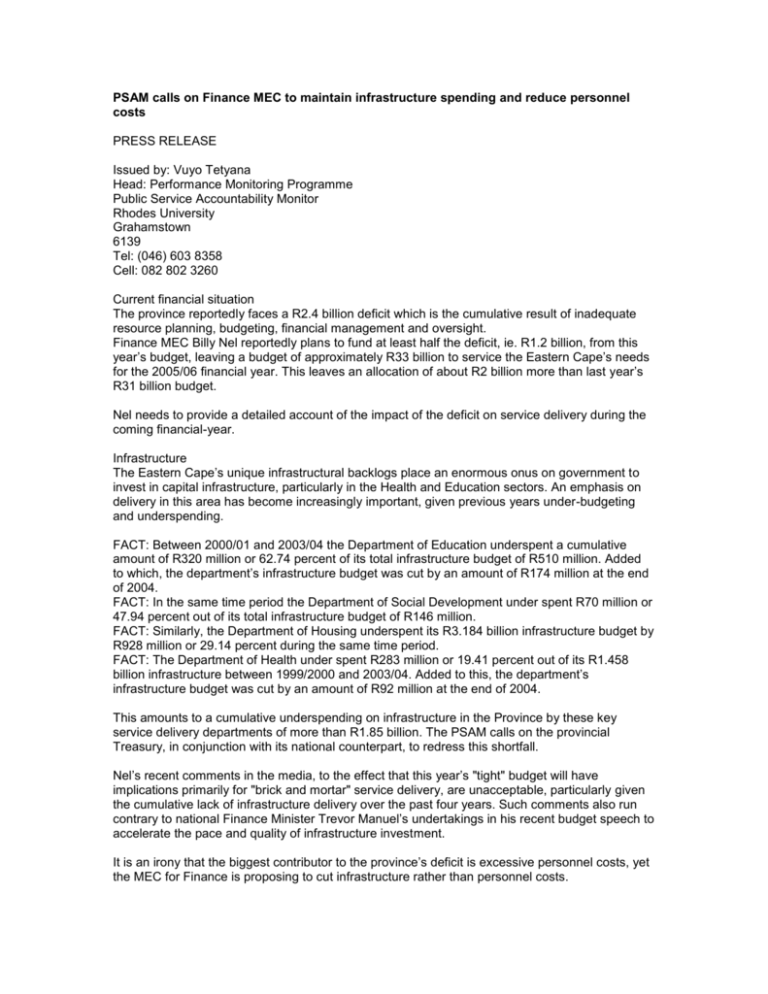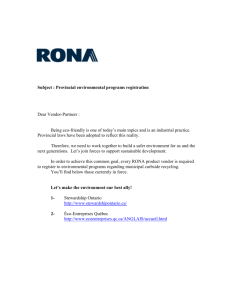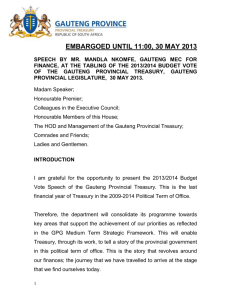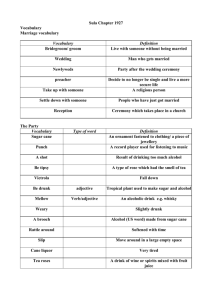PSAM calls on Finance MEC to maintain infrastructure spending and
advertisement

PSAM calls on Finance MEC to maintain infrastructure spending and reduce personnel costs PRESS RELEASE Issued by: Vuyo Tetyana Head: Performance Monitoring Programme Public Service Accountability Monitor Rhodes University Grahamstown 6139 Tel: (046) 603 8358 Cell: 082 802 3260 Current financial situation The province reportedly faces a R2.4 billion deficit which is the cumulative result of inadequate resource planning, budgeting, financial management and oversight. Finance MEC Billy Nel reportedly plans to fund at least half the deficit, ie. R1.2 billion, from this year’s budget, leaving a budget of approximately R33 billion to service the Eastern Cape’s needs for the 2005/06 financial year. This leaves an allocation of about R2 billion more than last year’s R31 billion budget. Nel needs to provide a detailed account of the impact of the deficit on service delivery during the coming financial-year. Infrastructure The Eastern Cape’s unique infrastructural backlogs place an enormous onus on government to invest in capital infrastructure, particularly in the Health and Education sectors. An emphasis on delivery in this area has become increasingly important, given previous years under-budgeting and underspending. FACT: Between 2000/01 and 2003/04 the Department of Education underspent a cumulative amount of R320 million or 62.74 percent of its total infrastructure budget of R510 million. Added to which, the department’s infrastructure budget was cut by an amount of R174 million at the end of 2004. FACT: In the same time period the Department of Social Development under spent R70 million or 47.94 percent out of its total infrastructure budget of R146 million. FACT: Similarly, the Department of Housing underspent its R3.184 billion infrastructure budget by R928 million or 29.14 percent during the same time period. FACT: The Department of Health under spent R283 million or 19.41 percent out of its R1.458 billion infrastructure between 1999/2000 and 2003/04. Added to this, the department’s infrastructure budget was cut by an amount of R92 million at the end of 2004. This amounts to a cumulative underspending on infrastructure in the Province by these key service delivery departments of more than R1.85 billion. The PSAM calls on the provincial Treasury, in conjunction with its national counterpart, to redress this shortfall. Nel’s recent comments in the media, to the effect that this year’s "tight" budget will have implications primarily for "brick and mortar" service delivery, are unacceptable, particularly given the cumulative lack of infrastructure delivery over the past four years. Such comments also run contrary to national Finance Minister Trevor Manuel’s undertakings in his recent budget speech to accelerate the pace and quality of infrastructure investment. It is an irony that the biggest contributor to the province’s deficit is excessive personnel costs, yet the MEC for Finance is proposing to cut infrastructure rather than personnel costs. Unlocking funds for critical posts Both the Department of Health and Education are projected to overspend on personnel this year. Yet they have among the highest staff vacancy rates in the province. This is particularly serious, given that these departments personnel budgets together account for 80 percent of the entire province’s personnel budget. Both these departments continue to employ thousands of non-core personnel. This is unacceptable, particularly in the existing context where there is a high critical post vacancy rate. The result is departments that are over-staffed but under-capacitated. Nel has to unlock funds for the filling of these critical posts in these departments, particularly at management level. At the same time he should take steps to address the excessive number of non-core personnel employed by the provincial administration. These personnel are the main cost driver fuelling the provincial deficit. Investment in training While some gains have been achieved in the state of financial management in the province-such as the gradual reduction of audit disclaimers as a result of poor financial reporting -significant budgeting, planning and financial management problems still remain. The current financial situation faced by the province cannot be allowed to be exacerbated or replicated due to poor financial planning and continued weak financial administration. The PSAM calls on the provincial administration to invest more money in recruiting qualified financial management staff and in capacitating its own senior management, particularly in the areas of strategic planning and budgeting. The administration needs to move away from its current reliance on consultants to perform this function. Hundreds of millions of rands are currently being squandered in this manner, with little long terms impact on the management of provincial resources. More money also needs to be invested in strengthening financial management within departments through appointment of appropriately skilled personnel and in the training of existing staff. There is an urgent need for all provincial service delivery departments to strengthen their information gathering and research functions, such that they are rendered capable of conducting accurate needs analysis to inform their programme activities and budget priorities. The PSAM also calls on MEC Nel to continue with those ‘austerity’ measures that curtail frivolous government spending and contribute to fiscal discipline. However such steps, while contributing to meeting the public administration’s constitutional obligation to promote "efficient, effective and economic use of resources" should not impinge on its obligation to deliver effective infrastructure and services and to respond to people's needs. ENDS For further information please contact: Vuyo Tetyana Head: Performance Monitoring Programme Public Service Accountability Monitor Rhodes University Grahamstown 6139 Tel: (046) 603 8358 Cell: 082 802 3260







